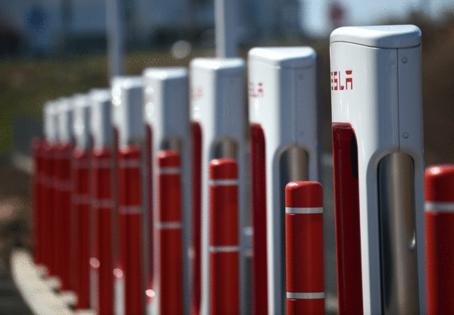Not even Elon Musk can doom the EV charger network
Published in Automotive News
Elon Musk may not like to talk about this, but Tesla Inc. probably wouldn’t be one of the world’s biggest automakers today if not for a $465 million U.S. government loan at a make-or-break phase in the company’s development. Tesla went on to repay the loan nine years early on the way to briefly having a market value of more than $1 trillion.
The lesson here is that sometimes a new enterprise needs a helping hand from a bigger player but can eventually thrive on its own. Musk is about to play a role in another demonstration of that lesson, but this time as the bigger player: Tesla has been necessary for kick-starting electric-vehicle adoption in the U.S. But the company is not necessary for its future success.
Tesla recently gutted the team managing its fleet of fast-charging Superchargers, and Musk said on his personal-grievance platform X that the company would grow the network “at a slower pace,” with “more focus on 100% uptime and expansion of existing locations.”
If you think fighting climate change is the same thing as wanting communism, then you could do worse for capitalism’s cause than driving a Cybertuck-sized hole in President Joe Biden’s plans to install 500,000 new EV chargers by 2030. If you are the CEO of an EV maker, on the other hand, then such a move is simply confusing.
Maybe Musk rethought the wisdom of sharing his charging infrastructure with other automakers, a commitment that drew praise from Biden, who broke his alleged personal taboo against publicly saying “Tesla.” Maybe Musk doubts BloombergNEF’s estimate that Tesla could turn an annual Supercharger profit of $740 million by 2030. Maybe he doesn’t have time to wait to cut costs, given how bad the company’s results are and how EV sales growth is cooling. Maybe he wants to sacrifice huge slabs of Tesla’s car business at the altar of the sacred robotaxi. Maybe he was just mad at (now former) Supercharger chief Rebecca Tinucci.
But there’s never much percentage in guessing what’s going on between Musk’s ears. The important thing for the world’s hopes of keeping global heating to merely disastrous levels is what his action means for the future of EV charging.
Make no mistake: It’s not great. Thanks in part to Tinucci’s efforts, Tesla is really good at making and installing EV chargers. Its extensive and reliable network has been a huge selling point for the company, helping customers overcome range anxiety. There’s no better proof of its dominance than the willingness of rivals to adopt its proprietary North American Charging Standard. Those automakers, including Ford Motor Co. and General Motors Co., now have fresh uncertainty about their own EV operations.
Tesla’s charger expertise also made it a potentially useful partner in Biden’s plans. The company has won $17 million in 2021 infrastructure-law grants to build stations, or 13% of the total, Politico reported. It’s also more efficient than other builders: That $17 million will theoretically build 41 stations, while another contractor will need $30 million to build 37 stations, according to Politico.
Losing any of that acumen won’t help a charger rollout that is already off to a sluggish start. The Washington Post reported last month that you could count the number of stations built under Biden’s $7.5 billion charger plan on two hands, with plenty of fingers to spare.
But that plan will take years to bear fruit while we wait for states to get around to adopting it. Meanwhile, people are still building chargers anyway — and most of them are not employed by Tesla. Since 2021, the country has added thousands of publicly available fast-charging stations, the kind you want when you’re on a road trip or if you can’t yet charge at home. And the bulk of those were not Tesla’s.
Given its long head start, Tesla still owns most of the country’s fast chargers, but that percentage has fallen from more than 90% a decade ago to about 60% today. You might want to check my math, but the fact that Tesla won 13% of the infrastructure law grants suggests non-Tesla companies won 87%.
And to fully electrify the country’s auto fleet — something I guess Americans absolutely have to do because public transportation frightens and confuses them — the lion’s share of chargers will be owned not by Tesla but by drivers: 27 million chargers out of the 28 million necessary, by the National Renewable Energy Laboratory’s estimate, will be at private homes and businesses.
Knowing Elon Musk as we do (or don’t), he may wake up tomorrow and decide he wants every member of his Supercharger team to come back to work. But if he doesn’t, then that’s a lot of prime EV-charger talent available for the hiring by Detroit automakers or (more likely) rival charger producers that want to stop being second fiddle. And Tesla’s standards will still be ubiquitous in the nation’s chargers, even if Tesla isn’t building them anymore.
©2024 Bloomberg L.P. Visit bloomberg.com/opinion. Distributed by Tribune Content Agency, LLC.







Comments